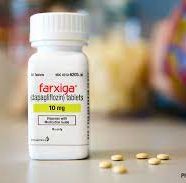
The Food and Drug Administration on Friday approved dapagliflozin (Farxiga) oral tablets to slow the progression of chronic kidney disease in adults both with and without type 2 diabetes.
Farxiga, an SGLT2 inhibitor, was found to reduce the risk of worsening renal function or cardiovascular or renal death by 39% when compared with placebo in patients with chronic kidney disease stages 2-4 and high levels of albumin in their urine. The same results were seen in patients both with and without type 2 diabetes, reported drugmaker AstraZeneca, also on Friday.
The drug first was authorized in 2014 to improve glycemic control in diabetes type 2 along with diet and exercise. It was approved in May 2020 to treat heart failure.
Farxiga is not expected to be effective in treating autosomal dominant or recessive polycystic kidney disease or in patients who require or recently have used immunosuppressive therapy to treat kidney disease, according to the FDA. It should not be used by patients on dialysis and may require changes to insulin dosages to reduce the risk of low blood sugar, the agency said.
Potential side effects include dehydration, serious urinary tract infections, genital yeast infections, and metabolic acidosis or ketoacidosis (acid build-up in the blood), the FDA added.
Johnson & Johnson’s SGLT2 drug Invokana also is approved to treat diabetic kidney disease, but not in kidney disease patients without diabetes, according to FiercePharma. Eli Lilly and Boehringer Ingelheim also have an SGLT2 rival drug called Jardiance, but data from its kidney disease outcomes trial aren’t expected until 2022, the news outlet reported.
Chronic kidney disease is a progressive condition typically caused by diabetes, high blood pressure and immune disease that results in decreased kidney function.




